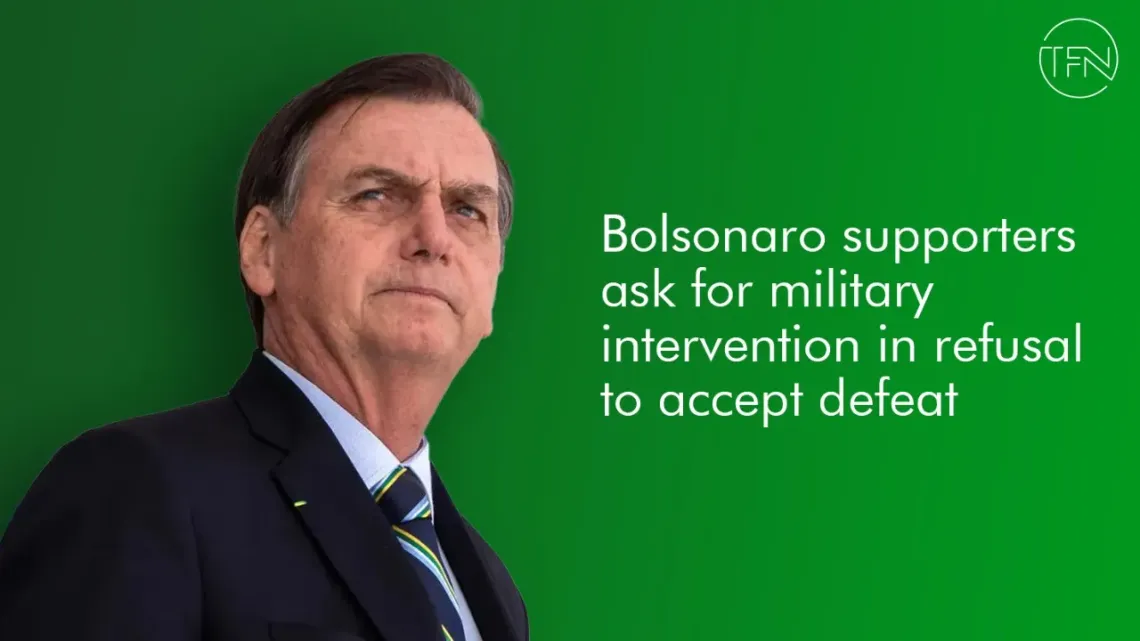They gathered outside military bases all around the nation on Wednesday, arriving by the tens of thousands, enraged, and wearing Brazilian flags. They claimed to be there to protect Brazil's democracy from a stolen election, and there was only one way to achieve that: the military needed to seize power.
It was a concerning demand in a nation that had endured a military dictatorship for two decades before 1985. It was also yet another strange development in the wake of Brazil's divisive elections.
A day earlier, after 45 hours of silence following his defeat by a leftist former president, Luiz Inacio Lula da Silva, the far-right president Jair Bolsonaro reluctantly consented to a transfer of power. But Mr. Bolsonaro's followers didn't seem to be ready to concede loss after his years of criticism of Brazil's electoral processes.
At a sizable demonstration outside the national headquarters of the Brazilian Army in Brasilia, Andrea Vaz, 51, a computer hardware vendor holding a placard that read, "Fraud in the voting machines!," said, "I don't understand it very well, but they have to interfere and have new elections." "We watched several videos. People purchasing votes with donations,” she continued. “There is evidence.”
On WhatsApp and Telegram groups, however, some protesters made demands that were more definite and drastic: the military should take control of the streets, the Congress and the Supreme Court should be abolished, and the president should continue to hold office, at least until new elections could be held.
The large-scale protests and calls for the use of force came as a result of the far-right in Brazil's refusal to accept the election of Mr. da Silva, a former president who many on the right consider a criminal due to his prior corruption scandal.
In a two-minute statement on Tuesday, Mr. Bolsonaro said he supported nonviolent demonstrations motivated by "feelings of unfairness in the electoral process." He did not mention his defeat.
That was viewed as a recommendation by many of his supporters. Larissa Oliveira da Silva, 22, who was supporting her fractured foot while sitting on a beach chair in the protest in So Paulo, said, "What he said yesterday gave me more energy to come. After hearing him speak, I could tell he was on our side."
After challenger Lula da Silva defeated President Jair Bolsonaro in the run-off election, truck drivers erected roadblocks throughout Brazil. Blockages have been observed in all but two states, greatly disrupting food supply networks. Lula won the Sunday run-off with 50.9% of the legal votes to Mr. Bolsonaro's 49.1% after all the ballots had been counted.
The federal highway police reported 342 such occurrences by Monday night, with the largest protests occurring in the south. Later, officers were able to remove some of the obstructions. Lula made a surprising comeback after being disqualified from running for office in 2018, which prevented him from doing so.
However, other protesters claimed that by agreeing to hand over power to Mr. da Silva on Tuesday, Mr. Bolsonaro had essentially conceded and that they were now turning to the military.
According to a statement from Brazil's Ministry of Defense, "the demonstrations are an exercise of freedom of expression, of thought, and assembly, by constitutional principles and current laws, provided they are orderly and peaceful."
According to a senior military officer who spoke on the condition of anonymity to disclose private talks, the military has not thought about interfering in the transition of power and, if the protests intensify, it may push the president to ask his supporters to go home. According to the official, the military, which assisted in overseeing the election, discovered no evidence of fraud.
According to the Ministry of Defense, election officials would receive its findings on the integrity of the vote shortly.
Nearly none of the more than 60 demonstrators in Brazil who have been interviewed since Sunday think the election was fair. Those opinions were based on the same suppositions, unverified information, and errors that Mr. Bolsonaro has propagated for years to support his contention that electoral fraud is rampant in Brazil.
They claimed they did not trust election officials because they had seen videos of the voting machines failing, and had read that certain patterns in the vote returns were suspicious.
However, they emphasized that Mr. Bolsonaro had received much greater support than Mr. da Silva and that almost everyone they knew had cast a vote for the president. Then, how could he have lost?
This question is spreading skepticism within the country.

